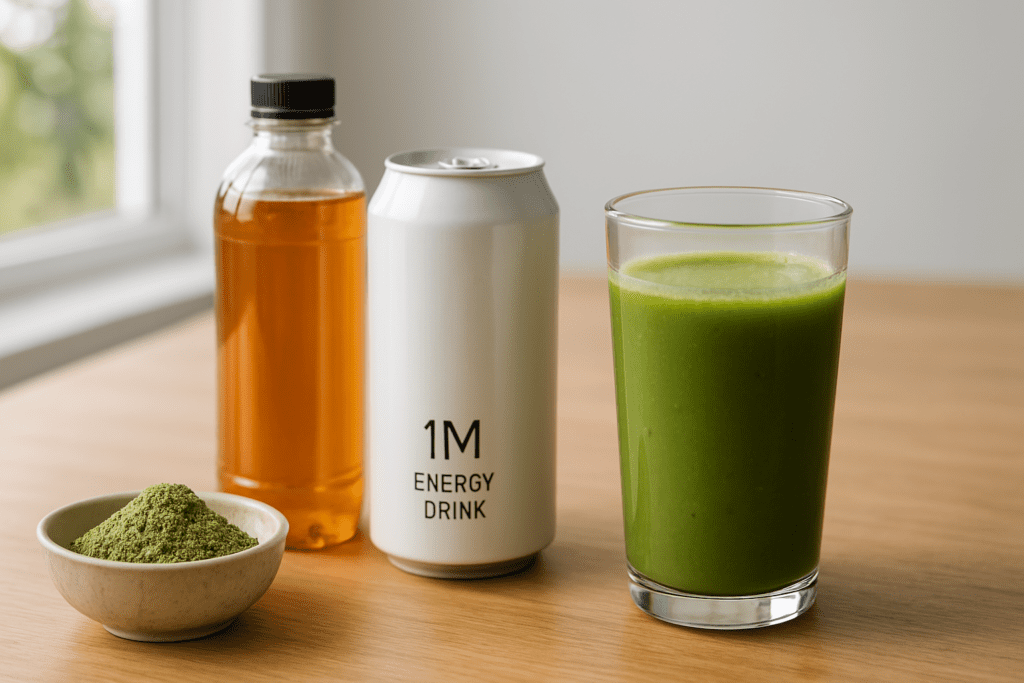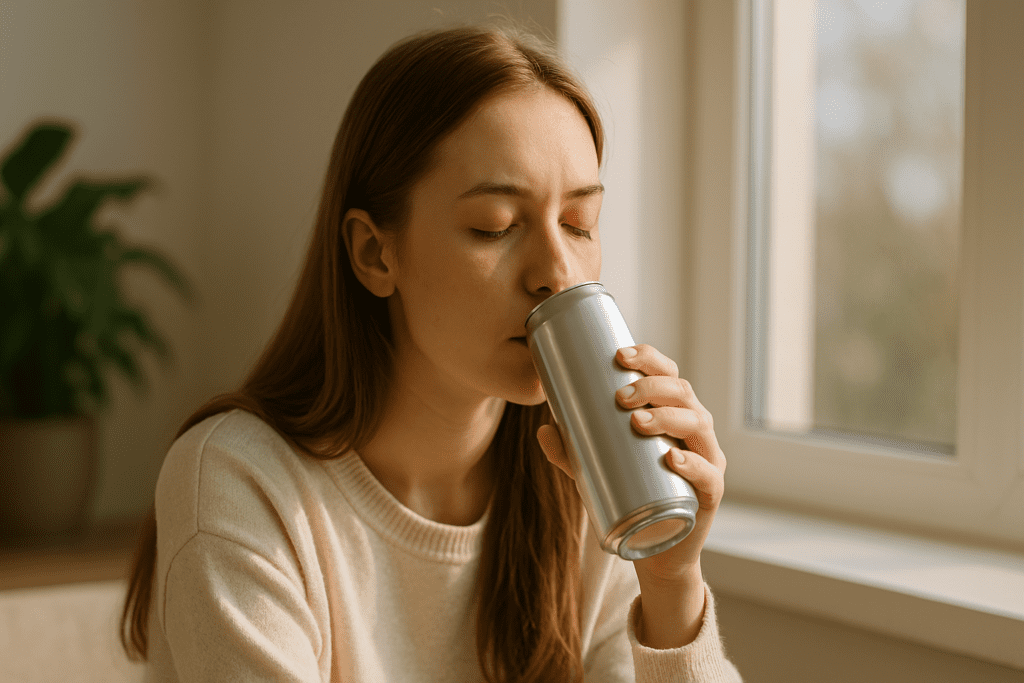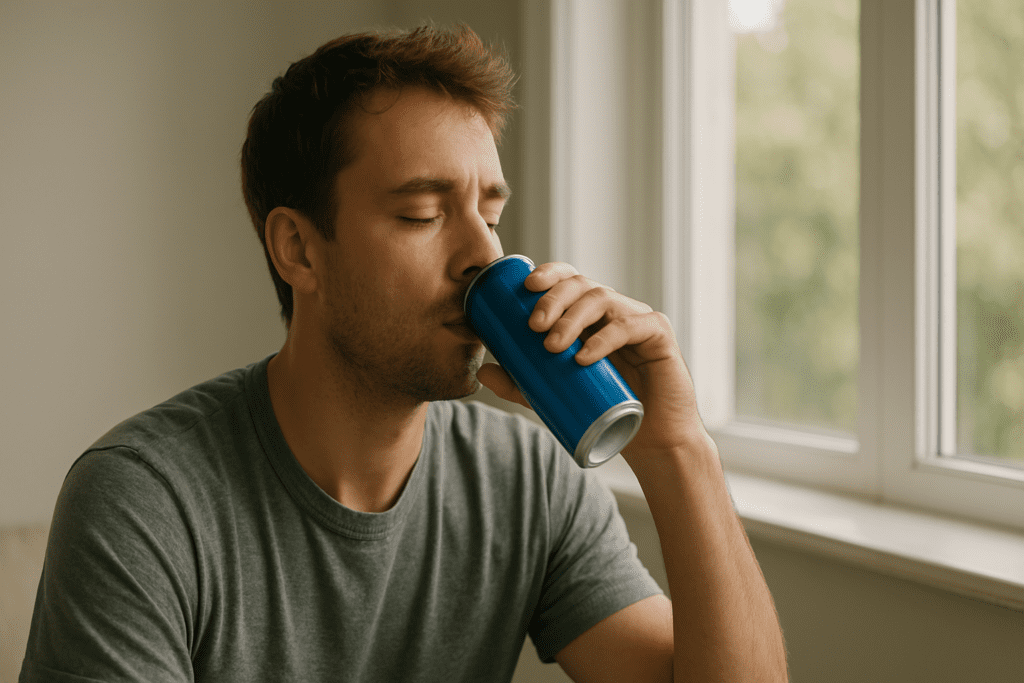When mental fatigue creeps in and focus starts to fade, many turn to energy drinks as a quick and convenient solution. But not all energy drinks are created equal, and the growing awareness of natural ingredients has changed how we approach the search for the best energy drink to stay awake and alert. With new research highlighting the powerful impact of clean, science-backed compounds like L-theanine, adaptogens, and nootropic blends, it’s no longer just about caffeine jolts and sugar highs. Today, the best energy drink to keep you awake and focused must do more than just stimulate—it should enhance cognitive function, stabilize energy levels, and support overall brain health.
You may also like: Best Herbal Stimulants for Energy and Focus: Natural Uppers That Work Without Caffeine
In this deep dive, we explore what the latest science reveals about the best energy drinks for focus, concentration, and wakefulness. Whether you’re pulling an all-nighter, powering through a long shift, or simply trying to avoid the afternoon crash, understanding the ingredients that truly work can help you make informed, energizing choices.

The Science of Staying Awake: Why Energy Drinks Work (or Fail)
At the core of any effective energy drink lies a blend of compounds designed to manipulate the brain’s alertness mechanisms. Caffeine is the most well-known player in this game, acting as an adenosine receptor antagonist. Adenosine, a neuromodulator, builds up throughout the day and signals the brain that it’s time to wind down. By blocking these receptors, caffeine prevents the sensation of fatigue, allowing for increased wakefulness and improved attention span.
However, caffeine alone is not enough to qualify a product as the best energy drink to stay awake. Excessive caffeine can lead to jitteriness, rapid heart rate, and eventual crashes. What makes an energy drink truly effective is how it balances caffeine with other brain-supportive ingredients. Amino acids like L-theanine, often sourced from green tea, have been shown to counteract caffeine’s overstimulation while enhancing its cognitive benefits. This synergy improves both focus and calmness, a rare but valuable combination for mental productivity.
Additionally, ingredients such as Rhodiola rosea and Panax ginseng have adaptogenic properties, helping the body and brain adapt to stress while reducing mental fatigue. B-vitamins, essential for mitochondrial energy production, further optimize the cellular processes that fuel our neurons. In contrast, drinks overloaded with synthetic sugars and artificial additives may deliver a brief lift but often result in rebound fatigue, impairing the very focus they promise to support.
Natural Ingredients That Enhance Mental Clarity and Energy
If you’re looking for the best energy drink to wake you up without compromising mental clarity, a growing body of evidence supports turning toward natural nootropic ingredients. Unlike synthetic stimulants, these natural compounds work with the brain’s own systems, promoting alertness without a harsh crash.
L-theanine stands out among natural energy-boosters. When paired with caffeine in a 2:1 ratio, studies show it helps increase focus while reducing anxiety and improving reaction time. This is one reason why green tea, which contains both compounds naturally, has been praised for centuries for its mentally uplifting qualities.
Rhodiola rosea, an adaptogenic herb used in traditional medicine, improves cognitive function during periods of stress and fatigue. It does this by modulating cortisol levels and promoting the balance of neurotransmitters like dopamine and serotonin, both of which are essential for sustained focus.
Panax ginseng, another potent adaptogen, has been shown to improve cognitive performance, particularly working memory and reaction speed. Its energizing effects are subtle but longer-lasting than those of caffeine, making it a valuable addition to any good energy drink to keep you awake during mentally demanding tasks.
B-vitamins—especially B6, B9, and B12—play a critical role in the synthesis of neurotransmitters and in maintaining energy metabolism. When energy drinks are fortified with these vitamins, they support the cellular machinery required for peak cognitive function.
Rethinking Caffeine: How Much Is Too Much?
Caffeine is undeniably powerful, but in the quest for the best energy drink to keep you awake and focused, it’s important to consider dosage and tolerance. The FDA considers 400 mg of caffeine per day to be a safe upper limit for most healthy adults, but individual sensitivities vary greatly.
While some popular energy drinks contain upwards of 300 mg per can, this amount can quickly tip into overstimulation, especially if combined with other sources of caffeine throughout the day. Symptoms like restlessness, insomnia, and anxiety are common indicators that your caffeine intake may be too high.
A more sustainable approach involves moderate caffeine dosages combined with balancing agents like L-theanine or magnesium. This allows for heightened alertness without the cognitive jitteriness or post-stimulant fatigue. It also helps support a more stable energy arc, preventing the kind of highs and lows that can sabotage productivity.
Moreover, caffeine works best when cycled or taken strategically. Drinking caffeinated energy drinks at the same time every day can lead to tolerance, reducing their effectiveness. For those seeking the best energy drink for focus, choosing blends that rotate or diversify stimulant sources (like yerba mate or guarana) can help maintain efficacy without overwhelming the system.
Avoiding the Crash: Why Sugar-Free Doesn’t Always Mean Better
Many people assume that opting for sugar-free energy drinks eliminates the risk of crashing. However, not all sugar-free alternatives are created equal. While cutting sugar helps avoid sharp spikes and dips in blood glucose, artificial sweeteners and synthetic flavor enhancers can still negatively impact brain chemistry and gut health.
Some sugar-free energy drinks use ingredients like sucralose or aspartame, which have been linked to disrupted insulin response and gut microbiota imbalance. These disruptions can indirectly impair energy levels and cognitive sharpness. On the other hand, natural sweeteners such as stevia or monk fruit are generally better tolerated and may offer a more stable energy profile.
It’s also crucial to consider the glycemic impact of other carbohydrates present in the drink. Some “sugar-free” options still include maltodextrin or dextrose, which act like sugar in the bloodstream and can lead to similar crashes. Choosing clean-label drinks with truly low glycemic ingredients is key when identifying the best energy drink to stay awake and mentally sharp without side effects.
In this way, it’s not merely about sugar content, but about the overall formulation. A sugar-free label doesn’t automatically make a product the best energy drink for focus, especially if it relies heavily on synthetic additives. What matters more is how each ingredient contributes to sustained mental clarity and physical wakefulness.
The Role of Nootropics in Energy Drinks for Mental Performance
Nootropics, often referred to as “smart drugs” or cognitive enhancers, have emerged as essential players in the next generation of energy drinks. These compounds support brain health and enhance mental performance without the overstimulation associated with traditional stimulants. In fact, the best energy drink to keep you awake and focused may be one that includes a carefully curated blend of natural nootropics.
Popular nootropic ingredients such as citicoline, bacopa monnieri, and alpha-GPC have shown promise in improving memory, attention span, and processing speed. Citicoline, a choline donor, enhances the production of acetylcholine, a neurotransmitter critical for learning and concentration. Alpha-GPC similarly supports cognitive function while offering mild stimulatory benefits that synergize well with moderate caffeine levels.
Bacopa monnieri, a herb rooted in Ayurvedic tradition, has been studied for its ability to enhance long-term memory and reduce the effects of mental fatigue. These effects are typically cumulative, meaning the benefits build with consistent use. Including bacopa in an energy drink aimed at cognitive enhancement reflects a shift in the market’s priorities—from instant energy to lasting mental performance.
The presence of these compounds marks a fundamental change in how we define a good energy drink to keep you awake. It’s no longer just about immediate stimulation, but about providing the brain with nutrients and compounds that support endurance, clarity, and long-term neurological resilience.

Frequently Asked Questions (FAQ): Best Energy Drinks for Focus, Wakefulness, and Mental Clarity
1. What’s the difference between energy drinks that boost focus and those designed just to keep you awake?
While many energy drinks aim to increase general alertness, there’s a clear distinction between the best energy drink for focus and one that simply helps you stay awake. Drinks that target focus often include nootropics like L-theanine, choline, or tyrosine, which are known to support cognitive processing and sustained concentration. On the other hand, energy drinks to stay awake usually rely more heavily on stimulants like caffeine or guarana, which can enhance wakefulness but may lead to jitteriness or mental fatigue later. Choosing the right formula depends on your needs—if you’re studying or working, a focus-enhancing drink may be more beneficial than one that only prevents drowsiness. Always check labels for cognitive-supporting ingredients, not just the caffeine content.
2. Can energy drinks that improve focus also support long-term cognitive performance?
Surprisingly, yes—if they’re formulated with the right ingredients. The best energy drink for focus may include compounds like citicoline, Rhodiola rosea, or bacopa monnieri, which have shown promise in supporting memory and executive function over time. While most consumers seek short-term boosts, regular use of nootropic-based drinks (as part of a balanced lifestyle) may contribute to neuroprotection and plasticity. Unlike quick-fix caffeinated beverages, these options provide layered benefits that go beyond just mental alertness. It’s essential, however, to avoid drinks with high sugar and synthetic additives, as they may negate any long-term benefits by contributing to inflammation or crashes.
3. Are there safer alternatives to highly caffeinated drinks that still help keep you awake?
Absolutely. Many good energy drinks to keep you awake now offer plant-based alternatives to traditional synthetic stimulants. Yerba mate, matcha, and green tea extracts are increasingly common, offering a smoother energy release thanks to naturally occurring L-theanine. These ingredients avoid the sharp spikes and crashes associated with conventional caffeine sources. In fact, the best energy drink to stay awake without side effects often contains a moderate dose of caffeine paired with adaptogens that buffer stress. For individuals sensitive to stimulants, microdosed formulations or drinks with added electrolytes can be effective in enhancing mental clarity while promoting hydration and endurance.
4. How do sugar-free energy drinks compare to regular ones for sustained wakefulness and concentration?
Sugar-free options have evolved significantly and can now rival or surpass traditional energy drinks in both efficacy and health impact. The best energy drink to keep you awake and focused often contains zero sugar but includes alternative sweeteners like stevia or monk fruit, which don’t spike insulin or cause energy crashes. More importantly, these formulations usually focus on synergistic ingredients such as B vitamins, taurine, and natural caffeine sources. This combination supports neurotransmitter balance, thereby improving focus and preventing the mid-afternoon slump. Long-term use of low-sugar energy drinks may also reduce the risk of metabolic disorders, making them a smarter choice for daily cognitive support.
5. Can energy drinks enhance performance during mentally demanding tasks like exams or coding?
Yes, and the best results come from drinks designed specifically for cognitive endurance. The best energy drink for focus typically contains L-tyrosine, a precursor to dopamine, which can sharpen motivation and problem-solving abilities under stress. Some newer formulas include acetyl-L-carnitine (ALCAR), which supports mitochondrial function and brain energy metabolism. When combined with natural caffeine and calming agents like theanine, these blends help maintain sustained attention without the burnout associated with high-stimulant drinks. Whether you’re taking an exam or debugging code, the right beverage can enhance your mental stamina and reaction time significantly.
6. Are there energy drinks designed for night-shift workers or people with irregular sleep schedules?
Yes, this niche is growing quickly. The best energy drink to stay awake during late shifts is typically formulated with ingredients that reduce mental fog without overstimulating the central nervous system. Ginseng, maca root, and lion’s mane mushroom are emerging favorites in these formulas, as they support both wakefulness and cognitive resilience under circadian stress. Unlike typical high-caffeine drinks, these blends are gentler on sleep architecture, making it easier to rest after a shift ends. Some options even include magnesium or calming botanicals in microdoses to prepare the body for sleep after the stimulation wears off. This functional balance is crucial for those who work non-traditional hours and still want restorative rest.
7. How do energy drinks affect hydration and why does it matter for staying awake?
Hydration plays a surprisingly critical role in maintaining alertness, especially during long work or study sessions. Many energy drinks to keep you awake now include electrolytes like potassium, magnesium, and sodium to help maintain fluid balance. Dehydration can lead to fatigue, mental confusion, and poor concentration—even if you’re consuming stimulants. The best energy drink to wake you up often incorporates a hydration element, ensuring that mental and physical fatigue is addressed holistically. Look for labels with added electrolytes or coconut water extract, which help preserve endurance and support brain function throughout the day.
8. Can frequent use of energy drinks impact mental health or lead to dependence?
Yes, and this is often an overlooked consequence. While the best energy drink to keep you awake can be safe when used occasionally, chronic overuse—especially of high-caffeine or sugar-laden options—may disrupt neurotransmitter balance and sleep patterns. This can lead to irritability, anxiety, or even dependency symptoms such as headaches or fatigue when not consumed. Nootropic-infused energy drinks that use adaptogens or amino acids may help buffer these effects, but moderation remains key. Those who rely on energy drinks daily should consider cycling their use or incorporating caffeine-free alternatives to avoid overstimulation and support long-term mental health.
9. Are there energy drinks tailored for older adults seeking mental clarity and energy?
Yes, and this is an exciting area of growth in the functional beverage space. The best energy drink for focus among older adults often emphasizes brain health ingredients like phosphatidylserine, vitamin B12, and CoQ10. These support mitochondrial function, reduce oxidative stress, and enhance cognitive vitality without over-reliance on stimulants. In this demographic, drinks that use lower doses of caffeine combined with anti-inflammatory herbs like turmeric or ashwagandha can be particularly beneficial. Since aging brains process stimulants differently, a gentler, more neuroprotective formula is often the most effective—and safest—choice for sustained clarity and wakefulness.
10. What innovations are shaping the future of energy drinks for cognitive performance and alertness?
The future of energy drinks to keep you awake lies in personalization, precision dosing, and bioavailability. New delivery systems like nanoemulsions and liposomal encapsulation are improving how quickly and effectively active compounds reach the brain. Brands are also exploring wearable tech integration, where biometric data informs when and how much to consume for optimal alertness. Some startups are even developing “smart drinks” that adjust their nootropic content based on time of day or cognitive demand. These innovations are elevating the category beyond temporary stimulation, aligning the best energy drink to keep you awake and focused with long-term brain wellness strategies. Expect to see more AI-driven recommendations and blood-sugar-stabilizing ingredients in the next generation of cognitive-enhancing beverages.

How Adaptogens Support Focus During Stress and Fatigue
Stress and fatigue are among the biggest enemies of focus. Chronic exposure to stress hormones like cortisol can impair memory, reduce attention span, and lead to long-term cognitive decline. This is where adaptogens step in, offering a powerful yet gentle way to support mental resilience.
Adaptogens like ashwagandha, Rhodiola rosea, and holy basil help modulate the stress response, allowing the brain to maintain clarity even under pressure. Ashwagandha has been shown to reduce cortisol levels and improve working memory, while Rhodiola enhances stress resistance and mental stamina.
The best energy drinks for focus often incorporate these herbs for their mood-stabilizing properties, creating a more balanced and sustained cognitive lift. Rather than spiking energy and then letting it drop, adaptogens support a consistent mental state that allows for improved concentration and better decision-making.
These natural compounds work on a deeper level than caffeine, supporting adrenal function and regulating neurotransmitters like dopamine and serotonin. This broader spectrum of action means adaptogens can be particularly effective for people facing long periods of mental or physical exertion, such as students, shift workers, and professionals juggling high cognitive loads.
natural energy boosters, nootropic drinks for focus, cognitive enhancers, alertness supplements, brain-boosting beverages, healthy energy alternatives, mental clarity support, clean energy drinks, caffeine alternatives, adaptogenic energy drinks, smart drinks for studying, productivity supplements, brain fog remedies, functional beverages, drinks for mental performance, natural stimulants, study energy solutions, energy without crash, focus-enhancing ingredients, sustainable energy sources
Further Reading:
The 8 Best Natural Energy Drinks, According to a Dietitian
We Tried 29 Popular Energy Drinks. Here’s How They Rank
The best energy drinks of 2025 and what to look for, according to a nutritionist
.Important Note: The information contained in this article is for general informational purposes only, and should not be construed as health or medical advice, nor is it intended to diagnose, prevent, treat, or cure any disease or health condition. Before embarking on any diet, fitness regimen, or program of nutritional supplementation, it is advisable to consult your healthcare professional in order to determine its safety and probable efficacy in terms of your individual state of health.
Regarding Nutritional Supplements Or Other Non-Prescription Health Products: If any nutritional supplements or other non-prescription health products are mentioned in the foregoing article, any claims or statements made about them have not been evaluated by the U.S. Food and Drug Administration, and such nutritional supplements or other health products are not intended to diagnose, treat, cure, or prevent any disease.


